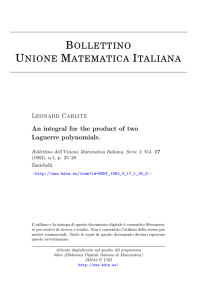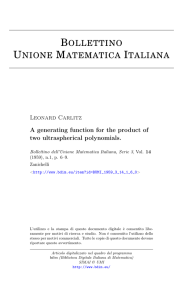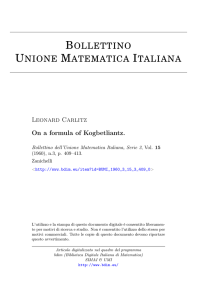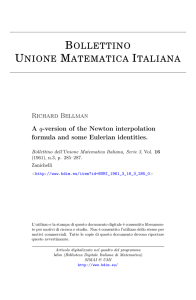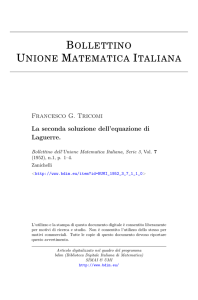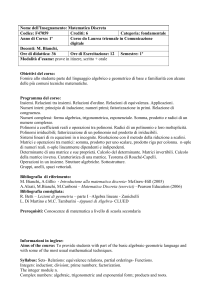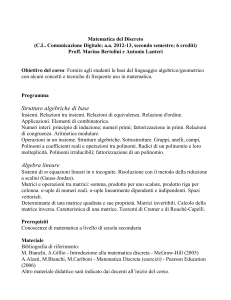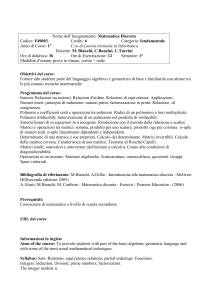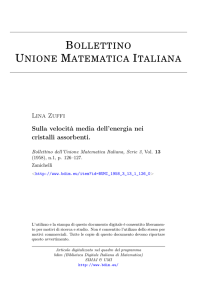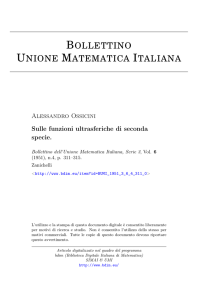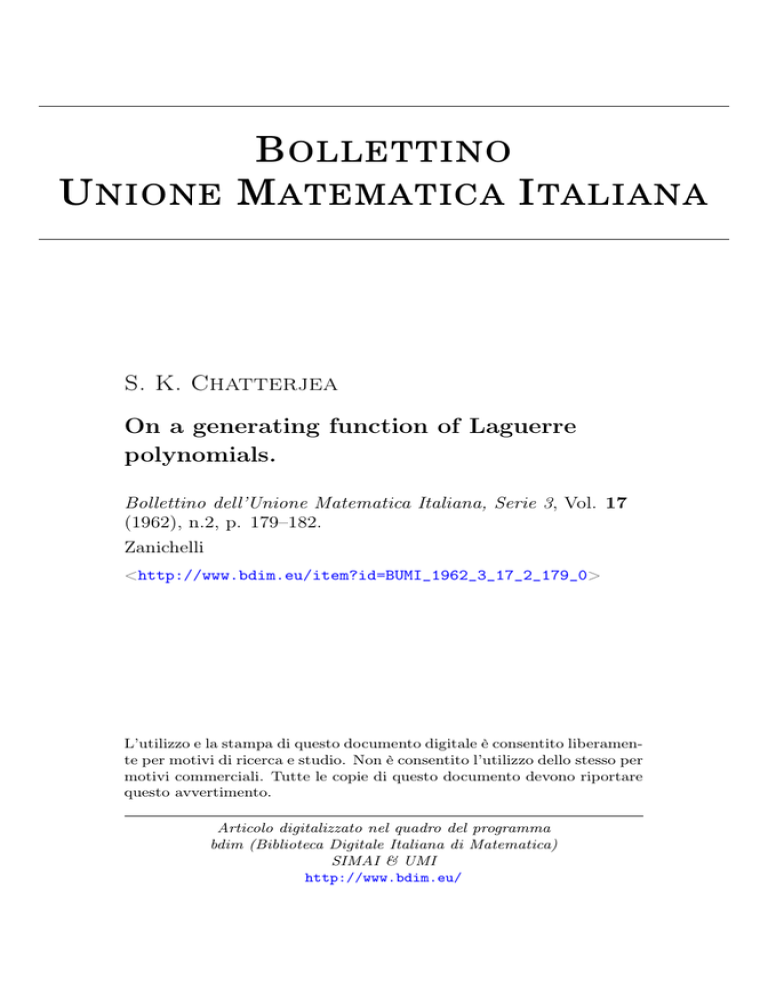
B OLLETTINO
U NIONE M ATEMATICA I TALIANA
S. K. Chatterjea
On a generating function of Laguerre
polynomials.
Bollettino dell’Unione Matematica Italiana, Serie 3, Vol. 17
(1962), n.2, p. 179–182.
Zanichelli
<http://www.bdim.eu/item?id=BUMI_1962_3_17_2_179_0>
L’utilizzo e la stampa di questo documento digitale è consentito liberamente per motivi di ricerca e studio. Non è consentito l’utilizzo dello stesso per
motivi commerciali. Tutte le copie di questo documento devono riportare
questo avvertimento.
Articolo digitalizzato nel quadro del programma
bdim (Biblioteca Digitale Italiana di Matematica)
SIMAI & UMI
http://www.bdim.eu/
Bollettino dell’Unione Matematica Italiana, Zanichelli, 1962.
On a generating function of Laguerre polynomials
Nota di S. K.
CHATTERJEA
(a Calcutta, India) (*) (*)
Sninmary. - A generating function for the Laguerre polynomials is derived
from their reçuttion formtdae-.
Introduction: The following generating funotion of
polynomials Ln (x). :
is due to
and follows from
DOETSCH
oo
(2)
/ xt
S LM(x)t« = (1 - t)~«-Hxp [-
by means of the
LAPLACE
mials
\
;
transformation. Recently
[1] proved the known generating function for
CVn+J{x),
LAGUERRE
(| t\ < 1)
TSCHAUNER
GEGENBATJER
polyno-
n = 0 , 1, 2 , , . . ; j p > - * ; :
G
2
(x)
Tii + n)
/vt\—P
where y = (1 — as*)2
from the recursion formula. Following the method adopted by
TSCHATJNER we like to prove (1) from the recursion formula of
LAGTJERRE polynomials:
(4)
(n H- 2)^n+2 - (2n + 3 + a » a;)w«4.i -+ (n H- a H- 1)MW = 0
where un = un(x, a) = Ln(x),
t*0 = 1, Mj — a H- 1 — x.
(*) Pervenuta alla Segreteria delPU.M.I. 1*8 aprile 1962.
(4) Department of Mathematics, Bangahasi College, Calcutta, India.
180
S. K. CHATTERJEA
using
njX, a)
L(n\x)
_
we dérive from (4) the recursion formula for vn(x, oc):
(5)
(n -H 2)(n -H a -t- 2)vn+2 — (%n -+• 3 H- a — £c)^n-t-i •+• s>n = 0
with
1
a H - 1 — as
l
"o — r(oc H- t) '
"" (a -H l)r(a -H 1) '
so that (oc H- l)u 1 — (a H- 1 — a^o =r 0.
Next multiplying both members of (5) by tn and summing from
n — 0 to oo w e obtain the following homogeneous differential
équation of order t w o :
(6)
* 7 + ( a + l - 2£)y — (a ^- i — œ - *)V
==(«+• l)vl — (a H- 1 — x)v 0 = 0,
where
=
S v»«».
Using the substitution
we dei'ive from (6) the following differential équation
(7)
WW + W + (Ux — a») W = 0
Finally using the substitution
V? = 3 and 2yx — y
we obtain from (7) the
(8)
0
BESSEL
differential équation
. ^ + 0 ^ + t o v _ a . ) W - = o,
which leads to the particular solutions
W = AJa{yB),
W=BYa(yz).
ON A GENEE AT ING FUNCTION
OF LAGUEBEE FOLYNOMIALS
181
Thus the particular solutions of (6) are
V(t) = A#(fT*aJa(2\rt)9
(9)
V(t) == J3e'(t)~ W fl (2Vô*).
Now since V(0)=v0 is finite, we take the particular solution
V{t) =
AetC1*aJa{2yJtó).
To détermine the normalising factor A, we notice
Y(0) = v0 =
r(a
_^ jj ^= il . 2 a r ( a _^ ^ ,
whence A = x *" .
Thus we obtain the generating fanction for the LAGTJERRE
polynomials
V(t) = S. ««(», a)<« = S r .^"f!_ 1 ,
(10)
= e«(te)~ ^ V a (2 V ^ ) ;
(a > — 1).
In particular; ^when a — 0. we derirè froni (10)
(H)
2
^
= ^.(2V5,.
Next using a = — ^, x = x2 and noticing the relation
we dérive ultimately
where s zn:V
Again using a = ^, x = acs and noticing the relation
182
S. K. CHATTERJEÂ
we similarly dérive
Lastly from (12) and (13) w e obtain on taking s = 2:
(14)
both of which may be compared with the formulae in [2].
REFERENCES
[1] J. TSCHAUNERJ Zur Evzeugung der Gegenbauerschen Polynôme, « Math
Zeitschr. -, Band 75, Seite 1-2, (1961).
[2] W. MAGNUS & F. OBERHETÏINGER, Formulas and theorems for the
functions of mathematical physics, Translated loy J. Wermer, ]NTew
York, JNT. Y., (1954), p. 81.

